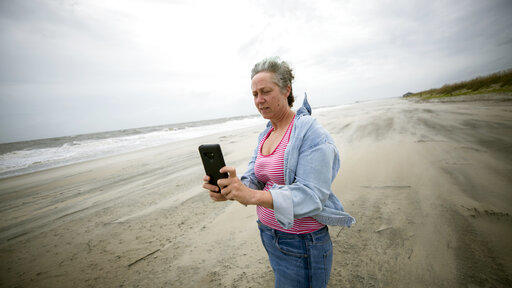Section Branding
Header Content
Georgia Coast Prepares For Hurricane Dorian
Primary Content
Hurricane Dorian is already affecting the state of Georgia, and its effects will be felt whether or not the storm makes landfall.
Hundreds of coastal residents have evacuated their homes and have been relocated to wait out the storm. GPB’s Emily Jones joined Rickey Bevington to talk about what the scene looks like on the Georgia coast.
This interview has been edited for length and clarity.
Rickey Bevington: So, is the storm actually going to hit Georgia?
Emily Jones: Well, we are not expecting a direct hit at this point. But, we are still expecting to see impacts from the storm, including tropical storm force winds probably starting sometime Wednesday into Thursday.
That's for Chatham County, where Savannah is, of course, farther south on the coast. Those impacts might start sooner.
We're also expecting storm surge, and we have already had some flooding and some higher than usual tides over the weekend. We're currently in a king tide cycle, which means higher than usual tides again. So there's a lot more water just sitting here in the system. That means the effects from the storm surge and the flooding could be worse than it would be without those high tides.
They're especially expecting issues of flooding with Monday’s high tide in the afternoon and then again during high tide overnight Wednesday and into Thursday.
Bevington: Do you get the sense that people are listening to the order from the governor and evacuating?
Jones: That's a little tough to gauge, just because so many people get in their own cars and leave.
I can tell you that from the evacuation assembly area in Savannah at the Civic Center, the numbers are way lower than we've seen in other storms. It was fewer than 400 around midday Tuesday. Of course, that's expected to keep increasing through the day. But with Hurricane Matthew, it was 2,200 people that evacuated from Savannah on buses to shelters inland.
Anecdotally, it seems like fewer people are leaving in their cars too. I haven't seen super long lines at gas stations, for instance.
Our colleagues in Middle Georgia are saying the traffic seems lighter than in previous storms and the shelters don't seem to be filling up quickly.
Bevington: For those who do stay on the coast, some places have actually declared curfews. Why is that?
Jones: More than anything, what the police are saying is it's an excuse to check up on people. That's what Savannah police Chief Roy Minter had to say earlier today.
RELATED: Kemp On Hurricane Dorian: 'Get Out Early Before This Thing Hits'
And, of course, those curfews are not in place everywhere, and they vary depending on where you are. There is a curfew for the city of Savannah and the city of Thunderbolt but not the rest of Chatham County, parts of Camden and Glynn counties are under curfew as well. But it's really best to just check with your local authorities and make sure you're tuned into what your local police or sheriff's office are saying.
Bevington: Absolutely. Emily, you’re living and working on Georgia’s coast right now. What is the overall mood among people?
Jones: Right now, more than anything it feels like just uncertainty and fatigue. This storm is moving really slowly, so everybody's been watching it super closely for a couple of days now.
I spoke to Congressman Buddy Carter, who represents the whole Georgia coast earlier, and he said it feels like the storm has been happening for weeks even though it's only been a few days.
And a lot of people I've talked to also think it won't be quite as bad as (hurricanes) Matthew and Irma, which it's not really clear what they're basing that on, maybe just the idea that the storm is farther off the coast.
Ultimately, at this point we really don't know what the impact is going to be. All these impacts are possible, but it's tough to say what will happen with the storm. They are saying if your property flooded during Matthew in 2016, there's a good chance it's going to flood this time as well.
Bevington: The truth is truly anything can happen. GPB’s Emily Jones is covering Hurricane Dorian from Savannah. Emily, thank you for joining me.
Jones: Thank you.



